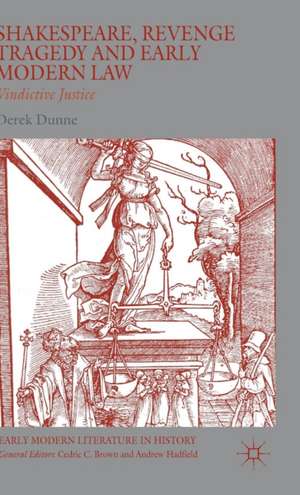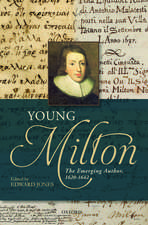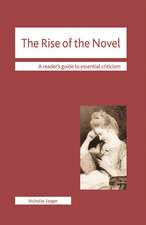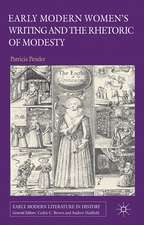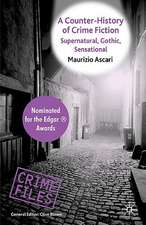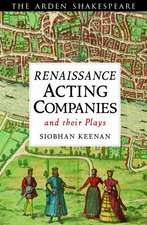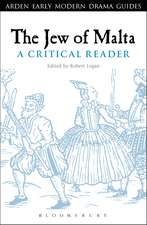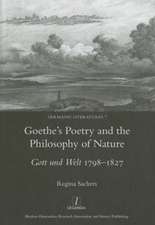Shakespeare, Revenge Tragedy and Early Modern Law: Vindictive Justice: Early Modern Literature in History
Autor Derek Dunneen Limba Engleză Hardback – 3 feb 2016
Din seria Early Modern Literature in History
-
 Preț: 395.47 lei
Preț: 395.47 lei - 20%
 Preț: 566.76 lei
Preț: 566.76 lei -
 Preț: 358.81 lei
Preț: 358.81 lei - 15%
 Preț: 704.17 lei
Preț: 704.17 lei -
 Preț: 408.92 lei
Preț: 408.92 lei -
 Preț: 387.75 lei
Preț: 387.75 lei -
 Preț: 392.60 lei
Preț: 392.60 lei -
 Preț: 389.70 lei
Preț: 389.70 lei -
 Preț: 390.25 lei
Preț: 390.25 lei -
 Preț: 387.20 lei
Preț: 387.20 lei -
 Preț: 390.63 lei
Preț: 390.63 lei -
 Preț: 390.63 lei
Preț: 390.63 lei - 15%
 Preț: 705.51 lei
Preț: 705.51 lei -
 Preț: 389.70 lei
Preț: 389.70 lei - 15%
 Preț: 639.41 lei
Preț: 639.41 lei - 18%
 Preț: 939.94 lei
Preț: 939.94 lei -
 Preț: 388.72 lei
Preț: 388.72 lei -
 Preț: 387.20 lei
Preț: 387.20 lei -
 Preț: 386.61 lei
Preț: 386.61 lei -
 Preț: 388.90 lei
Preț: 388.90 lei - 15%
 Preț: 702.54 lei
Preț: 702.54 lei -
 Preț: 389.11 lei
Preț: 389.11 lei - 15%
 Preț: 642.51 lei
Preț: 642.51 lei - 15%
 Preț: 640.06 lei
Preț: 640.06 lei - 15%
 Preț: 638.43 lei
Preț: 638.43 lei - 15%
 Preț: 698.94 lei
Preț: 698.94 lei -
 Preț: 386.39 lei
Preț: 386.39 lei - 15%
 Preț: 639.08 lei
Preț: 639.08 lei -
 Preț: 384.86 lei
Preț: 384.86 lei -
 Preț: 388.90 lei
Preț: 388.90 lei -
 Preț: 391.61 lei
Preț: 391.61 lei - 15%
 Preț: 643.00 lei
Preț: 643.00 lei -
 Preț: 391.61 lei
Preț: 391.61 lei -
 Preț: 387.75 lei
Preț: 387.75 lei -
 Preț: 389.70 lei
Preț: 389.70 lei -
 Preț: 390.63 lei
Preț: 390.63 lei - 15%
 Preț: 634.49 lei
Preț: 634.49 lei -
 Preț: 386.81 lei
Preț: 386.81 lei -
 Preț: 390.63 lei
Preț: 390.63 lei - 15%
 Preț: 641.85 lei
Preț: 641.85 lei -
 Preț: 388.72 lei
Preț: 388.72 lei - 15%
 Preț: 638.76 lei
Preț: 638.76 lei -
 Preț: 388.72 lei
Preț: 388.72 lei -
 Preț: 387.75 lei
Preț: 387.75 lei - 18%
 Preț: 728.11 lei
Preț: 728.11 lei - 15%
 Preț: 643.84 lei
Preț: 643.84 lei -
 Preț: 389.11 lei
Preț: 389.11 lei -
 Preț: 389.49 lei
Preț: 389.49 lei
Preț: 640.71 lei
Preț vechi: 753.77 lei
-15% Nou
Puncte Express: 961
Preț estimativ în valută:
122.63€ • 127.53$ • 102.61£
122.63€ • 127.53$ • 102.61£
Carte tipărită la comandă
Livrare economică 15-29 martie
Preluare comenzi: 021 569.72.76
Specificații
ISBN-13: 9781137572868
ISBN-10: 1137572868
Pagini: 229
Ilustrații: IX, 229 p.
Dimensiuni: 140 x 216 x 14 mm
Greutate: 0.43 kg
Ediția:1st ed. 2016
Editura: Palgrave Macmillan UK
Colecția Palgrave Macmillan
Seria Early Modern Literature in History
Locul publicării:London, United Kingdom
ISBN-10: 1137572868
Pagini: 229
Ilustrații: IX, 229 p.
Dimensiuni: 140 x 216 x 14 mm
Greutate: 0.43 kg
Ediția:1st ed. 2016
Editura: Palgrave Macmillan UK
Colecția Palgrave Macmillan
Seria Early Modern Literature in History
Locul publicării:London, United Kingdom
Cuprins
Acknowledgements
A Note on Texts
Introduction: Staging Justice
1. Vindictive Justice in Early Modern England
2. Correcting Justice with Vengeance in The Spanish Tragedy
3. Titus Andronicus: The Evidence of the Senses Under Threat
4. Antonio's Revenge, Riot, and Collective Action
5. Exceptional Hamlet and Resistance to Law
6. Piracy, Insurrection, and The Tragedy of Hoffman
7. The Revenger's Tragedy: Post-Participatory Justice
Conclusion: Participation and Vindication on the Early Modern Stage
Notes
Bibliography
Index
A Note on Texts
Introduction: Staging Justice
1. Vindictive Justice in Early Modern England
2. Correcting Justice with Vengeance in The Spanish Tragedy
3. Titus Andronicus: The Evidence of the Senses Under Threat
4. Antonio's Revenge, Riot, and Collective Action
5. Exceptional Hamlet and Resistance to Law
6. Piracy, Insurrection, and The Tragedy of Hoffman
7. The Revenger's Tragedy: Post-Participatory Justice
Conclusion: Participation and Vindication on the Early Modern Stage
Notes
Bibliography
Index
Recenzii
“This monograph offers a striking perspective on revenge tragedy by placing the genre within the combined field of law and literature. … The monograph is an invaluable resource for scholars of early modern theatre as well as legal and social historians.” (Jessica Apolloni, Early Theatre, Vol. 21 (1), 2018)
Notă biografică
Derek Dunne has taught at the University of Fribourg, Switzerland, Shakespeare's Globe, London, and Queen's University, Belfast. He has published on the mathematics of revenge, trial by jury in the early modern period, and the representation of women on trial. Derek's research interests span Shakespeare's contemporary dramatists, early modern Inns of Court culture, cony-catching pamphlets and counterfeiting.
Textul de pe ultima copertă
Revenge tragedies are filled with trial scenes, miscarriages of justice and untrustworthy evidence, yet this is the first study to explore how the revenge plays of Kyd, Shakespeare and others critically engage with their legal system. Featuring groups of citizens taking the law into their own hands, revenge tragedies stage a participatory justice of their own, which problematises the progress of English common law during this crucial phase of English legal history.
By connecting English revenge tragedies to major crises within the legal system – including the erosion of trial by jury (Titus Andronicus), food riots in the 1590s (Antonio's Revenge), and debates over royal prerogative (The Revenger's Tragedy) – a persistent legal critique is revealed to be at work. The book also offers a major new reading of Hamlet that argues against the play's engagement with law, in contrast to the radical socio-legal commentary identified in other revenge plays. Revenge tragedy can thus be understood as an index of early modern citizens' fractious relationship with their law.
By connecting English revenge tragedies to major crises within the legal system – including the erosion of trial by jury (Titus Andronicus), food riots in the 1590s (Antonio's Revenge), and debates over royal prerogative (The Revenger's Tragedy) – a persistent legal critique is revealed to be at work. The book also offers a major new reading of Hamlet that argues against the play's engagement with law, in contrast to the radical socio-legal commentary identified in other revenge plays. Revenge tragedy can thus be understood as an index of early modern citizens' fractious relationship with their law.
